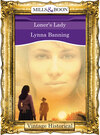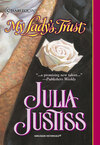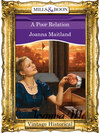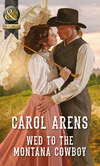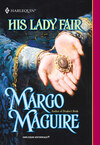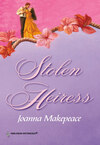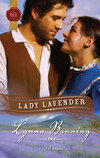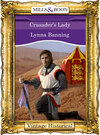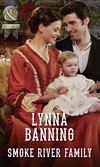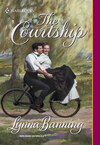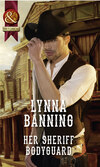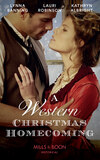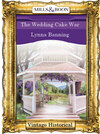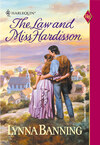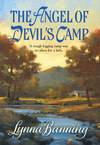Kitabı oku: «Loner's Lady», sayfa 2
Chapter Three
S he lay in the creek bed, the lower part of her body half in the water, her skirt rucked up to her knees. Her head rested on a lichen-covered stone, and he could see one leg was folded under her at an odd angle. Jess stumbled down the bank and splashed across to her, a rock lodged in his gut.
She looked up at him with weary eyes. “What are you doing here?”
Jess knelt beside her, his heart hammering. “A better question might be what are you doing here?”
She tried to smile. “Chasing the c-cow into the pasture, and I s-slipped on a rock.” Her voice sounded close to breaking. Her body shivered violently, and Jess reached to touch her arm. Her skin was like new snow.
“How long have you been here?”
Her eyelids fluttered closed. “Since dawn. I got up to milk…” Her voice trailed into silence.
“I milked earlier,” Jess said.
“Tiny was gone, and… Anyway, the cow…”
Jess leaned over her. “Don’t talk, Ellen. Save your strength. I’ve got to get you out of the creek, and it isn’t going to be easy.”
“Hurts when I move,” she murmured.
“Got any laudanum up at the house?”
She shook her head.
“Whiskey?”
“Just some wine. Port. In a decanter on the top shelf. It was a…” she gave a soft laugh “…wedding gift.”
“I’ll get it.”
He started to stand up, but her fingers grabbed at his arm. “No. Don’t leave. Please don’t. I will manage without it.”
Jess studied the position of her body. Looked like a broken tibia. Should he straighten her leg first? Or lift her up and let the injured limb right itself? Either way it would hurt like hell. Maybe he could pull her backward up the creek bank, see if her leg would straighten naturally.
He straddled her, one knee in the cold creek water, the other on the bank, and dug his hands into the mud beneath her armpits. As gently as he could, he hoisted her farther up the slope. Her face went white as parchment. Her breathing hitched and she balled her hands into fists, but she didn’t make a sound.
Dragging her was no good, he realized. Too painful and too slow. He needed to get her to the house, and fast.
“I’m going to be sick,” she moaned. Clamping her palm over her mouth, she stared up into his face, a desperate, trapped look in her eyes.
“It’s okay, Ellen. Listen to me. I’m going to lift you up. It’s going to hurt, but it’s the only way.”
She nodded once.
“Put your arms around my neck and hold on,” he ordered.
When her cold, shaking hands met at his nape, Jess carefully scrabbled away the wet earth under her shivering form until he could slide one hand under her shoulders. Gritting his teeth, he bent and slipped his other hand under her knees.
When he lifted her from the muddy bank, she released a strangled cry, but he stood up slowly, cradling her body in his arms. Her injured leg unfolded and she cried out again.
A choking sensation closed his throat. Trying not to jostle her any more than necessary, Jess picked his way up the slippery incline, concentrating on her jerky breathing rather than the ache in his own leg. When he reached level ground, he started toward the house. It seemed a hundred miles away.
He stepped every inch of the way with her moans of agony in his ear, his nerves twisting at every inarticulate sound she made. Jess unclamped his jaw. “You all right?”
“Of course I’m not all right,” she muttered through clenched teeth.
He kept moving. Halfway across the yard, she tugged on his shirt, and he heard her whisper, “Talk to me.”
“I can’t think of a damn thing to say,” he admitted.
“Talk to me anyway.”
His mind went blank. What could he talk about? He hadn’t had a woman in his arms since… He didn’t want to think about it.
After a long minute, he began to sing in a low, scratchy voice. “‘Whippoorwill singin’, and the owl’s asleep. I’m beggin’ you, Lord, my soul to keep.’”
Ellen pressed her ear closer to his chest. Underneath the smell of damp mud, he caught the faint scent of roses from her hair. “More,” she murmured.
“That’s all there is. Kind of a one-verse song.”
“Either you sing,” she said in a tight voice, “or I’ll start screaming.”
Jess sucked in a long breath. “That might be better than my singing.”
“Not for me,” she snapped.
It sounded as if her jaw was clenched. “Sorry. I wasn’t thinking.”
“Don’t think, Mr. Flint. Sing.”
“Yes, ma’am. All right, here goes. ‘Tater has no eyes to see, sweet corn cannot hear. Beans don’t snap, date palms don’t clap, that’s why I like my beer!’”
What a choice. He was drunk when he’d made it up, and drunk when he sang it. He sure as hell wasn’t drunk now.
He reached the back porch steps, angled sideways and yanked the screen door open. It fell to one side with a clatter. He’d repair it after breakfast, he thought. With Ellen down, there would be more to do than fix screens and gates.
In spite of himself, he smiled. Now she’d be forced to have him stay on as a hired man. Things couldn’t have worked out better if he’d planned it.
Upstairs in the blue-papered bedroom, Jess stooped to lay her on the bed, but she stopped him with a sharp “No!”
“What do you mean, no? I’ve got to take a look at your leg. Might have to splint it. You’d best be lying flat.”
“My skirt is muddy.” She gestured with her hand. “My grandmother’s quilt…”
Without a word Jess dipped toward the bed and pulled the pretty blue quilt onto the floor. It smelled faintly spicy. The whole room did, he noted. Maybe a bunch of Iona Everett’s lavender…
He laid Ellen down on top of the sheet. After breakfast, there’d be a washing to do, as well.
Ellen gritted her teeth. God, oh God, it hurt! She couldn’t feel her toes, but somewhere between her thigh and her ankle, a saw was slicing into the bone. “Get the port,” she managed to gasp.
She heard his boots clump down the stairs, then back up. In his hands he held the decanter of purple-brown liquid and a water glass. She shut her eyes against the nausea sweeping over her, listened to the clink of the decanter neck on the edge of the tumbler, and the gurgle of the wine as it sloshed out. She could tell by the sound that he filled the glass to the top. She could hardly wait to swallow a big mouthful.
He steadied her hand around the glass and lifted her head off the pillow so she could drink. “Wonderful,” she breathed as the warmth of the first gulp spread down into her belly. “Tastes like melted raisins.”
“Drink some more. Then I’m going to look at your leg.”
“I don’t want to move, so can you leave my skirt on? Just pull it up?”
Jess hid a smile. It wasn’t the first time he’d tossed up a woman’s skirts. But this time sure felt less arousing.
“Ready?”
She downed another mouthful and nodded.
He unlaced her wet boots and drew them off, trying not to listen to her gasps of pain. Raising the sodden hem of her skirt and the petticoat underneath, he gently lifted the fabric up to her waist. At the first sight of her drawer-covered limb he knew what had happened. The front leg bone had snapped just below the crest.
From her undergarments rose the smell of soap and something spicy. Too bad he’d have to cut that lacy material away. He pulled the ruffled cotton petticoat to discreetly cover her bare knees. He might have traveled on the shady side of the law, but he was still a gentleman.
“Your right leg is broken,” he said carefully. “You’ve got two choices, Miz O’Brian. I can take Tiny and ride for a doctor, or I can set the bone myself.”
She groaned. “Dr. Callahan—he’s my uncle—lives in town. Too far.”
Jess bit his lower lip. “How close is your nearest neighbor?”
“Gundersen place,” she whispered. “Seven miles.”
Oh, God. He would have to do it.
In the kitchen he boiled a kettle of water, tore a clean dish towel into strips and searched for a knife. The worst part for him would be cutting her drawers off. The worst part for her would be when he explored the break.
He stuffed a sharp paring knife under his belt and turned to the back door. Outside, he strode to the front gate and snapped off two relatively straight branches to use as a splint. On his way back through the kitchen, he lifted the kettle off the stove and grabbed a china bowl from the dish shelf.
Upstairs the sun threw dappled light across the upper part of her body. She rested the wineglass on her chest, holding it with both hands. Almost empty, he noted. Good girl.
Grasping the knife, he bent and started slicing at the lacy hem of her drawers. He slit them halfway to her waist, and she didn’t make a sound until he straightened.
“How does it look?”
“Your left leg is fine.” It was the right leg that made his breath catch. Under the pale skin he could see the bulge of the bone where it had separated. “To set the break in your right leg properly, I’ll have to manipulate it.”
Jess wiped his fingers across his forehead; they came away wet with sweat, which didn’t surprise him. He’d rather rob the Ohio Central than put his hand on her leg.
“Don’t drag it out,” she muttered from the bed. “Just get it over with.”
“Don’t rush me,” he countered. “I like to take my time with some things.”
He was damn glad she didn’t ask what things. He settled one hand on her knee, then cupped the joint with his other. Watching her face, he moved both hands toward the break. The closer he got, the tighter she scrunched her eyes shut.
His belly knotted. “I’m sorry, Ellen.” Gently he eased his fingers onto the bulge of skin, then felt below her knee with his other hand. There it was, plain as pudding. He could feel how the edges of the bone fit together.
Mentally he reviewed exactly what he had to do. Before he made a move, he glanced up at her face. Hell, she was sweating worse than he was. He’d try to make it quick.
He braced himself. Holding one hand steady under the break, he pressed his palm down hard from the top. Her anguished scream sent a sharp, cold blade into his chest, but an instant later he heard the soft snap as the bone shifted back into place.
She screamed again.
“Yell if you want, just don’t move,” he ordered.
While she panted on the bed, he laid out the makeshift splints. One of the gate sticks curved just the right way along her leg; the other was straighter, but it would do. He bound them in place with strips of toweling.
“Better,” Ellen murmured. Her leg ached like a plow had hooked into it, but it wasn’t the searing pain she’d endured earlier. “How did you learn to do that?”
“Spent some time as an army surgeon during the war.”
Thank the Lord. She wouldn’t ask which army. Reb or Federal, she was grateful for the man’s skill.
He straightened suddenly, reached for the decanter of port and tipped it into his mouth.
“I’d offer you my glass,” she said, “but…oh, here.” She thrust the tumbler at him anyway. “You’ve earned it.”
He smiled for the first time in what seemed like hours. He’d shaved since supper last night, she noticed. The dimple in his cheek reappeared.
She watched him pour hot water from the kettle into her best vegetable bowl and drop in a piece of toweling. Clean, she hoped.
He bent to smooth the wet cloth over her good leg, washing off the streaks of dried mud with a surprisingly light touch. “I don’t fancy cutting you out of your skirt and petticoat. Seems like a waste of serviceable garments. Got any ideas?”
What an incredible topic of conversation! Still, it had been an unusual day, and it was still only ten o’clock, she judged, glancing at the sun outside the window.
“If you could undo the fastenings at my waist, you could just pull my skirt and petticoat off over my head.”
“Yeah, I thought of that.” Taking it slow and easy, he washed her broken limb from the ankle to the break, then started at her upper thigh and worked down as far as her knee. When he finished, he set the bowl of grimy water on the floor and leaned over her.
“The skirt button’s at the back,” she said. “Petticoat has a ribbon tie.”
“Usually does,” he answered.
Ellen’s eyebrows lifted. She felt his hands reach under her waist, fumble the skirt button through the buttonhole and then untie the ribbon of her petticoat.
He moved to the head of her bed. “Arms up,” he ordered.
Ellen obliged, grateful that she didn’t need to move her throbbing leg to rid herself of her clothes. She felt both garments slide upward, and with her arms raised she managed to shimmy free of them. He tossed them on the floor with the washcloth and caught her gaze. “You want to remove your—”
“Just my shirt,” she said quickly. “I’ll keep on my camisole and my drawers, what’s left of them.”
She unbuttoned the blue cotton shirt and he helped her shrug out of it, his hands warm and sure. He was much more than a doctor, she guessed. He seemed to know a great deal about women’s clothes fastenings.
At the moment, it was his experience as a doctor that she valued. His experience with women didn’t matter a whit.
Chapter Four
D r. James Callahan gallantly tipped his black felt top hat at the pretty young woman he met on the board sidewalk. “Mrs. Kirkland.”
“Dr. Callahan! I was just thinking about stopping in to see you. It’s about the baby.”
A faraway look came into the elderly man’s gray eyes. The first baby he had ever delivered scared the bejeesus out of him. Not because of the blood and the bruised and swollen flesh—he’d seen plenty of that in medical school—but because then, in his twenty-third year, he saw clearly what loving someone meant. A woman bravely—and sometimes not so bravely, he learned as he grew older—endured the agony of labor, risked her life to present her husband with a gift more costly, more treasured than anything on God’s earth. His own sister, his niece Ellen’s mother, had died bearing a child. James had never forgotten it.
“Nothing wrong with the baby, I hope?”
Mrs. Kirkland dimpled. “Far from it. Thad is thriving. Actually, it’s my husband I am concerned about. He seems…different since the birth.”
James understood instantly. A man hearing his wife’s screams of agony for a day and half the night, a man who didn’t stumble out to the barn and shoot himself, was changed forever by the experience. Sometimes James thought that’s what had started his sister’s husband with the drink. Ellen’s father had let spirits destroy his life. It had almost destroyed her, as well.
“I wouldn’t worry, Mrs. Kirkland. Husbands often feel pretty shaken by birth, just as much as the new mother. Maybe he’s just realizing how precious you are to him.”
Mrs. Kirkland seized his free hand. “Oh, thank you, Dr. Callahan. I think you are such a very wise man!” She squeezed his hand and pivoted away into Svensen’s Mercantile.
Wise my ass. The love between a husband and wife had astounded him back then. He knew that no woman would ever feel that way about him. He’d always been painfully shy, and awkward around women. Different. Most men would rather play poker than spend their evenings reading Byron.
Twenty-five years ago he’d been a callow tenderfoot fresh out from the East, practicing his first year of medicine and dumb as an ox when it came to talking to a female without a stethoscope in his hand.
He had known this about himself for more than two decades. No sane woman would love him, would suffer and sacrifice for him the way he saw the wives of Willow Flat do for their men. All his life he’d been too awed by women to ever speak to one in anything other than a professional situation. Now he was forty-eight years old.
But Lord knew if a man never said good-morning to a lady, that man never got invited to afternoon tea. He got plenty of invites to down a slug or two of red-eye at the Wagon Wheel Saloon, but lately he felt a nagging hunger for something more. Something soft that smelled good. That smelled like lavender.
He’d waited all these years for Iona Everett, and time was growing short. If he didn’t do something about it damn quick, he’d die a bachelor.
Near noon, Ellen heard Mr. Flint tramp up the stairs to her room, a tray with two plates of scrambled eggs and two mugs of coffee in his hands. The sun’s rays beat at the bedroom window. Already the room was stifling; today would be a real scorcher.
She watched the man squeeze himself into her rocking chair and roll back and forth, nursing his coffee while she ate her breakfast. When she had eaten nearly all the eggs, she reached for her own mug on the bedside table and gulped down a large swallow.
Well! The man made excellent coffee, the best she’d ever tasted.
They sipped their coffee in silence until Mr. Flint set his mug on the plank floor, unfolded his long legs and ambled to the window. Without speaking, he drew the blue muslin curtains shut.
“What are you doing?” Her voice came out sharper than she intended.
“Hot in here. Be cooler if you block the sun.”
“Oh.” Of course. She was always up and out in the barn shortly after sunup, and she didn’t come back upstairs until after dark. She couldn’t remember when the last noontime had found her still in bed.
She turned her coffee mug around and around in her hands. “How long will I be laid up like this?”
His dark eyes met hers, an unnerving glint of amusement in their depths. “Long enough. Longer than you’re going to like. Your bone has to knit before you put any weight on it.”
Her fork clunked onto the plate. “How long?” she repeated.
He settled his rangy form back into the rocker, stretched out his legs and crossed his boots at the ankle. “I’d say you need a hired hand for the next few weeks.”
Ellen choked on her coffee. “Weeks! I can’t stay bedridden that long. My vegetables will shrivel up in this heat. The cow will go dry. The hens…” She had to keep the farm going, but he’d never understand her desperate need to do so.
He gave her a speculative look. “You want your leg to heal crooked? Have a limp the rest of your life?”
“Well, no.” A sudden curiosity seized her. “Is that what happened to your leg?”
He said nothing.
“Mr. Flint? I asked you a question.”
“I heard you. Could be I’m not going to answer it.”
Irritation tightened her jaw. “And why is that?”
“Because it’s none of your business,” he said quietly.
Ellen bit her lip. “You’re right, of course. I shouldn’t have asked.” But lordy-Lord, she couldn’t lie here being an invalid, even for a few days. How would she water the vegetables and bake bread and churn butter and…all the other things that demanded her attention?
She set the mug aside and knotted her fingers together. “I can’t pay you wages.”
Mr. Flint’s gaze met hers, his eyes hard as sapphires. “Didn’t ask for any. I was thinking about meals and a place to sleep in your barn.”
“Oh, no, I don’t think—” The memory of the last wayfaring man she’d hired still made her stomach churn. But how would she manage without help?
“For how long?” She made her tone as crisp as she could.
The oddest look flitted across his face, instantly replaced by a carefully impassive expression. “Let’s say for as long as it takes.”
As long as it takes? Something about the way he said that made her uneasy. “I can ask the Gundersen boy to help out. He’s chopped wood for me in the winter and last summer he helped bring in the hay.”
“I’ll be better than the Gundersen boy.” Mr. Flint said it without apparent pride, just stated it as if he were saying, “Today is Tuesday.”
“Besides,” he added, “I want to stay.”
Ellen opened her mouth without thinking. “Why?”
The rocking motion stopped abruptly. “You’re one nosy woman, Miz O’Brian.” He looked at her for a long minute, his eyes so stony she caught her breath.
“I know,” she said with a sigh. “I guess it comes from being alone. I question everything. It is nosy, but I need to be, well, careful. I don’t much trust men, ever since Dan…”
“Yeah.” He nodded once, downed the last of his coffee and set the mug on the floor beside him.
Ellen studied his face. He hid his feelings cleverly. Dollars to doughnuts there was something he wasn’t telling her.
“Mr. Flint, you have not answered either of my questions.”
“You’re right.” He rose, scooped his coffee mug off the floor, stacked her empty plate on his. “Maybe I’m tired of traveling. Maybe I want to stop somewhere and rest awhile.”
He didn’t look at her when he spoke.
Maybe. And maybe I’m the Queen of Sheba. Ellen smoothed out the sheet covering her lower torso.
“Anyway, Miz O’Brian, might be smart to say thanks, and wait till you’re on your feet again. Right now you’re in no position to run me off.”
Ellen blinked. Was that a threat? She listened to the irregular rhythm of his footsteps going down the stairs. He was right about one thing: she did not want her leg to heal crooked.
It would make it even harder to hold on to the farm for when Dan returned. And if she had the child her heart yearned for, how would she tend it if she was crippled? It would be impossible to chase after a toddler if she couldn’t walk right.
Ellen closed her eyes against the pain of her longing. It was foolish to hope for a child when her husband might be dead.
Downstairs, dishes clattered. The hand pump squeaked and water trickled into the sink. The back door opened, shut, then opened again. Later a rhythmic thonk-thonk carried on the still air, like an ax biting into a tree. She let the noises wash over her.
When she woke the sky was a milky lavender. Almost twilight. The curtains had been pushed back and the sash raised to catch the breeze. The soft squawks of her chickens drifted up from the yard. Bullfrogs croaked down by the creek, and the still, warm air smelled of dust.
She loved this place with its earthy smells, the warm, peaceful evenings and the mornings alive with inquisitive finches chattering in her apple trees. Her life moved forward in an ordered sequence of events, guided by the rising and setting of the sun. It was predictable. Safe.
It didn’t matter that chores filled every hour between dawn and dark. The cow needed to be milked, the horse fed and the stall mucked out. The vegetables weeded, apples picked and cooked into applesauce… Oh, Lord, the drudgery never ended. Sometimes she felt as if she were suffocating.
But it would be worth it in the end. Dan would be so pleased when he returned, so proud of her. Something unforeseen must have happened to him that day he left for town. An accident, perhaps. Whatever it was, when he came home he’d find the farm prospering and his wife waiting with welcoming arms.
With a wrench she turned her mind away from Dan. She wouldn’t allow herself to brood. She’d think about how peaceful it was just lying here in her bed, listening to the quiet noises she never had time to stop and enjoy—twittering finches in the pepper tree, Florence lowing across the meadow.
No sound came from downstairs. Maybe Mr. Flint had absconded with her horse and her cow, after all?
Don’t be an idiot. If that rambling man had wanted either, he would have taken them this morning and not returned. True, he did take the horse, but he’d brought him back. Even so, it was hard to trust him. Even if he could set a broken leg.
By late afternoon Jess still tramped the perimeter of Ellen’s farm. His shadow lengthened, but he had to learn the lay of the land. Stopping under the same spreading oak he’d climbed earlier, he knelt, unfolded a rumpled sheet of brown grocer’s paper and wrestled a pencil stub out of his jeans pocket.
“Here, and here,” he muttered. He marked the points with an X on the makeshift map, then sketched in the barn, the house, the creek and the pasture beyond it, the apple trees at the back of the property, even the tree under which he sat. Chewing the tip of the pencil, he studied the layout, then bent to draw a grid over the landmarks. Each square represented maybe five long strides. He’d start at the upper left boundary and methodically work his way across and then down. He’d cover every goddam inch of this ground before husband Dan came home.
By suppertime, Jess had milked Florence and locked the hens in their shelter. For the evening meal he boiled up an armload of sweet corn he’d picked, and heated a can of beans from her pantry. He dished up two plates, piling his own high with ears of corn, and clumped upstairs to Ellen’s bedside.
He also carried with him the oak limb he’d cut and shaped this afternoon. By God, he was more nervous about what she’d think of that bit of wood than about his cooking.
Ellen heard him coming up the stairs, a clump and a pause, clump and pause. Balancing two steaming plates in his hands, he walked to the chiffonier and set them down next to the water basin.
“Got something for you,” he said in a gravelly voice.
“Supper, so I see. That is good of you, Mr. Flint.”
“Something besides supper.” He unhooked an odd-shaped length of tree limb from his forearm and presented it for her inspection. “It’s a crutch. I made it this afternoon.”
Ellen stared at it. The wood had been cleverly shaped using the natural curve of the limb to fashion an underarm prop, padded with one of her clean dish towels. Her throat tightened.
She appreciated his gesture more than she could say.
She tried to smile, but her lips were trembly. “How very kind of you, Mr. Flint.”
“It’s a necessity, the way I see it. You need a way to get around, even if it’s only as far as your wardrobe and the commode. Which, I assume, is under the bed?”
Her face flushed with heat. “It is.” Surely they should not speak of such an intimate matter as her commode? It made her feel uneasy, as if he knew things about her she wished he didn’t.
He laid the crutch at the foot of the bed and turned to the plates on the chiffonier. “You can try it out after supper.”
He settled two pillows under her shoulders and laid another across her lap, pulled two forks out of his shirt pocket and handed her one. Her plate he settled on the lap pillow. Two ears of corn swam in a puddle of melted butter, and suddenly she was ravenous.
“I cannot imagine why I should be so hungry! All I’ve done is lie in bed all day.” She lifted the corn and sank her teeth into the tender, sweet kernels, watching Mr. Flint settle into the rocker and begin to eat as well.
“Healing uses energy, just as much as baling hay. That’s why you’re hungry.”
Ellen tipped her head to look at him. “You really are a doctor, aren’t you?”
“Was one once, yes, as I told you. Sounds like you didn’t believe me. I served four years, until—” He stopped abruptly.
“Until?”
“Until I stopped believing I could save anyone.”
“Sometimes I don’t know what I believe,” Ellen heard herself say. She gnawed another two rows of kernels to hide her embarrassment. Butter dribbled down her chin but she didn’t care. Corn on the cob had never tasted so good.
He sent her a penetrating look. “Why is that, Miz O’Brian?”
“It was clear once. Before Dan left. I believed in him. I believed in the farm, the land. In myself. I knew what my duty was as a wife.”
She shouldn’t be telling him this! But she’d kept the fight between her duty and her feelings inside for so long she would burst if she didn’t let out just a little bit of it. “Now, I…well, of course I still believe in the land.”
Jess stopped rocking. “But not in yourself?”
She shook her head, then started on the second ear of corn on her plate. “Not so much anymore. Sometimes I have to ask myself…” She stopped, surprised at her need to talk about it. Surprised by the feelings she had kept locked up inside her.
He tipped the rocking chair forward. “You ever ask yourself what you will do if Dan doesn’t come back? Why a woman like you is wasting her life waiting for a man who’s been gone all these years?”
Her eyes widened. “Well, yes. I keep thinking one of these days he’ll just walk in the gate, but it’s been almost three years. I don’t know how to stop waiting for him.”
Jess nodded. “I wondered the same thing about my own life once. Nobody walked through my gate, so one day I got the bit in my teeth and walked through it myself. Left the army and came north.”
With Callie. That’s where everything started to go sour.
“I expect I am talking too much,” Ellen said. Her cheeks grew pink as she forked up her beans. “I always talk to myself when I’m frightened or worried about something.”
“Long conversations?” He didn’t have the vaguest idea why he asked that, other than he was taken with the idea of her talking to herself. What did an almost-dried-up farm wife say to herself?
“Oh, not always. Sometimes I talk to Florence while I’m milking her. And the chickens, although they are terrible listeners.”
Jess choked back a snort of laughter. Chickens. And Florence.
“Sometimes I even talk to my carrots and tomatoes. I tell them how proud I am that they grow so nicely.”
Jess fastened his gaze on the plate of food in his lap. Her guileless confession was like a sharp stick poking at his heart.
“I’d say you’re lonely, Miz O’Brian.”
She said nothing for a long while. Finally she pushed her empty plate to one side of the lap pillow and laid her fork down alongside the two well-cleaned corncobs. “Mr. Flint, could I trouble you for a glass of water?”
Jess grinned. She sure could. He’d thought about his surprise most of the day. That is, when he wasn’t busy mapping the property. Tipping the two corncobs from her plate onto his, he went downstairs, returning in a few moments with two glasses of cold liquid.
“Lemonade!” she exclaimed at the first taste. “Where did you—?”
“At the mercantile in town.” The look of wonder and delight on her face pricked his chest in a way he hadn’t expected.
